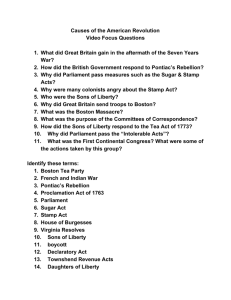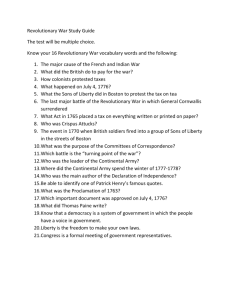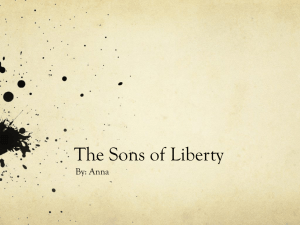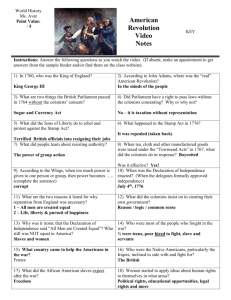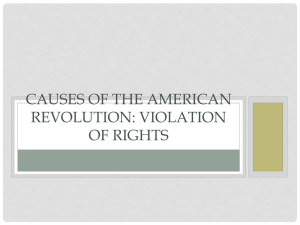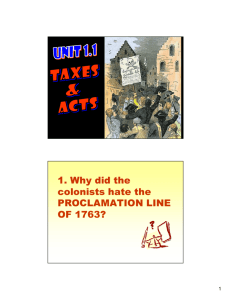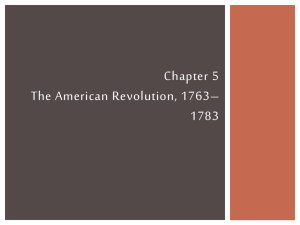Sons of Liberty: Patriots or Terrorists? How A Secret Society of Rebel Americans
advertisement
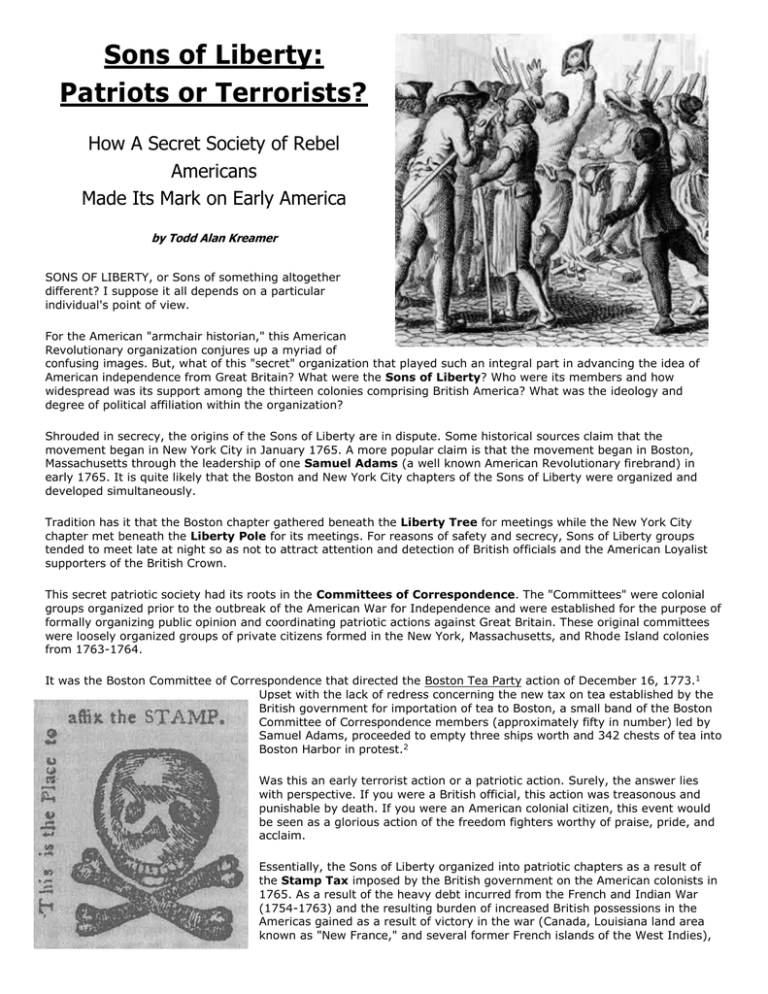
Sons of Liberty: Patriots or Terrorists? How A Secret Society of Rebel Americans Made Its Mark on Early America by Todd Alan Kreamer SONS OF LIBERTY, or Sons of something altogether different? I suppose it all depends on a particular individual's point of view. For the American "armchair historian," this American Revolutionary organization conjures up a myriad of confusing images. But, what of this "secret" organization that played such an integral part in advancing the idea of American independence from Great Britain? What were the Sons of Liberty? Who were its members and how widespread was its support among the thirteen colonies comprising British America? What was the ideology and degree of political affiliation within the organization? Shrouded in secrecy, the origins of the Sons of Liberty are in dispute. Some historical sources claim that the movement began in New York City in January 1765. A more popular claim is that the movement began in Boston, Massachusetts through the leadership of one Samuel Adams (a well known American Revolutionary firebrand) in early 1765. It is quite likely that the Boston and New York City chapters of the Sons of Liberty were organized and developed simultaneously. Tradition has it that the Boston chapter gathered beneath the Liberty Tree for meetings while the New York City chapter met beneath the Liberty Pole for its meetings. For reasons of safety and secrecy, Sons of Liberty groups tended to meet late at night so as not to attract attention and detection of British officials and the American Loyalist supporters of the British Crown. This secret patriotic society had its roots in the Committees of Correspondence. The "Committees" were colonial groups organized prior to the outbreak of the American War for Independence and were established for the purpose of formally organizing public opinion and coordinating patriotic actions against Great Britain. These original committees were loosely organized groups of private citizens formed in the New York, Massachusetts, and Rhode Island colonies from 1763-1764. It was the Boston Committee of Correspondence that directed the Boston Tea Party action of December 16, 1773.1 Upset with the lack of redress concerning the new tax on tea established by the British government for importation of tea to Boston, a small band of the Boston Committee of Correspondence members (approximately fifty in number) led by Samuel Adams, proceeded to empty three ships worth and 342 chests of tea into Boston Harbor in protest.2 Was this an early terrorist action or a patriotic action. Surely, the answer lies with perspective. If you were a British official, this action was treasonous and punishable by death. If you were an American colonial citizen, this event would be seen as a glorious action of the freedom fighters worthy of praise, pride, and acclaim. Essentially, the Sons of Liberty organized into patriotic chapters as a result of the Stamp Tax imposed by the British government on the American colonists in 1765. As a result of the heavy debt incurred from the French and Indian War (1754-1763) and the resulting burden of increased British possessions in the Americas gained as a result of victory in the war (Canada, Louisiana land area known as "New France," and several former French islands of the West Indies), British Parliament decided to station British "regular" troops in the American colonies to keep the French from attempting to recapture Canada and to defend the colonies against the Native American Indians.3 It should be noted that the vast majority of Native Americans sided with the French in the North American Theater of the Seven Years War (1756-1763) and had a notorious record of carrying out terrifying raids against British colonists in the frontier regions of the New York, Pennsylvania, Massachusetts, Virginia, Maryland, and Carolina colonies dating back to the middle seventeenth century. The Stamp Act of March 1765 was instituted to help defray the costs of maintaining British troops in the American colonies by issuing tax stamps for a wide range of public documents including: customs documents, newspapers, legal papers, and licenses. The British government believed that this stamp tax passed specifically for the American colonies was quite fair and just as a means to help pay their share of the huge national debt incurred from the Seven Years War. After all, reasoned Parliament, had not the colonies directly benefited from the war and the expulsion of the French threat from Canada? While Parliament felt that the American colonies should pay their fair portion of the war debt, the colonists responded with outrage and indignation. The Stamp Act, like the Sugar Act before it, reasoned the colonists, was yet another example of Parliament trampling on the colonial legislature's right to tax their own people. Actions and attitudes of colonists regarding perceived British monetary atrocities against their well being formed the foundation for the rallying cry of American patriots across the land namely, "no taxation without representation." The American colonists had no physical representation or voice in London Parliament, nor did they ever wish to, assert many historians. With actual American representation in Parliament, there would be no need for seeking independence.4 The Sons of Liberty organizations responded to the Stamp Act of 1765 in various ways. The New York Sons of Liberty declared in December 1765 that they would "go to the last extremity" with their lives and fortunes to prevent the enforcement of the Stamp Act. This declaration included the use of violence if necessary. Acts of rebellion against the Stamp Tax in New York City included an incident from January 9, 1766 in which ten boxes of parchment and stamped paper were delivered to City Hall and immediately confiscated, unpacked, and burned by secret leaders of the New York Sons group.5 Some merchants simply refused to pay the stamp excises. Printers, lawyers, laborers and small shopkeepers simply ignored paying the duty and carried on business as usual.6 Sometimes, the actions and reactions of the Sons of Liberty to the Stamp Act took a violent turn as recorded in a local New York City merchant's diary in April, 1765. Violence broke out with the arrival of a shipment of stamped paper to the Royal Governor's residence. Cadwallder Colden, the acting Royal Governor of the New York colony and scholarly correspondent of Benjamin Franklin and Dr. Samuel Johnson, was extremely frightened of the patriotic group and so locked himself up securely inside Fort George immediately after he received the stamped paper from British officials. A few hours after receiving the official papers, a raucous mob captured the governor's gilded and spectacular coach and reduced it to a pile of ashes. From here the mob (consisting largely of extremist elements of the New York Sons of Liberty) raced uptown to the home of Fort George's commander, smashing numerous windows and breaking into the wine cellar to sustain their "patriotism" before descending on the rest of the house in a convulsion of vandalism.7 Tarring and feathering Loyalists — those individuals who sympathized and were supportive of the British Crown, royal tax collectors, and other officials — was a common practice carried out by the more radical elements of the organizations. Ironically, the Sons of Liberty ultimately took their name from a debate on the Stamp Act in Parliament in 1765. Charles Townshend, speaking in support of the act, spoke contemptuously of the American colonists as being "children planted by our care, nourished up by our indulgence...and protected by our arms." Isaac Barre, member of Parliament and friend of the American colonists, jumped to his feet in outrage in this same session to counter with severe reprimand in which he spoke favorably of the Americans as "these Sons of Liberty."8 American colonists had several friends supportive of their views on the tax situation including: William Pitt (the Elder), Charles James Fox, Edmund Burk, and others. The two original Sons of Liberty organizations (New York City and Boston) quickly established correspondence and communications with ever emerging Sons of Liberty groups in New England, the Carolinas, Virginia, and Georgia. Typically, members of this organization were men from the middle and upper classes of American colonial society. Although the movement began as a secret society, for reasons of safety and anonymity, the organization quickly sought to build a broad, public base of political support among the colonists. Frequently, cooperation with undisciplined and extralegal groups (city gangs) set off violent actions. Even though the Sons seldom looked for violent solutions and eruptions, they did continue to elicit and promote political upheaval that tended to favor crowd action. While British officials accused the Sons organizations of scheming to overthrow the true and legitimate government of the American colonies, the Sons of Liberty viewed their official aims in more narrow terms, organizing and asserting resistance to the Stamp Act. Outwardly, the Sons of Liberty proclaimed their unfaltering loyalty and allegiance to King George III of Great Britain and emphasized their support of the English Constitution against the usurpation of royal officials.9 For eleven years, 1765 to 1776, American colonists saw British Parliament as the collective "bad guy," not the king! The Sons of Liberty as a viable movement first broke up with the repeal of the Stamp Act in 1766. However, the organizational network was revived in 1768 in response to the Townshend Acts (a series of excise duties on glass, lead, paints, paper, and tea imported into the colonies.) From 1768 until the end of the American Revolution, Sons of Liberty groups remained in active correspondence with one another throughout the thirteen American colonies and each group took charge of organizing and effecting resistance movements against what they perceived as unfair British taxation and financial strangulation within their respective colonies. The Sons of Liberty as an active movement disbanded in late 1783.10 In the end, no universal conclusions, judgments or definitive statements can be made about the Sons of Liberty. Were they a terrorist organization? The British certainly believed they were. After all, the Sons were advocating overthrow of the status quo government and independence for the thirteen colonies. Were they a patriotic organization? Many American colonists certainly believed they were. The Sons represented to them the American freedom fighter personified, fighting for their rights and ultimate independence. It should be noted that the Loyalists also had their version of Committees of Correspondence and Sons of Liberty namely: the United Empire Loyalists. One thing is certain about the Sons of Liberty organization: it gave American colonists a voice and vital chance to actively participate in the independence movement. Finally, the decision on the Sons of Liberty comes down to a variation on an old saying, "one man's terrorist is another man's patriot." The ultimate conclusion must be left to the individual. Notes 1. Microsoft (R) Encarta, "Committees of Correspondence" (New York: Funk & Wagnall's Corp. Pub., 1993) CD ROM. 2. CD Sourcebook of American History, "The Boston Tea Party" by Thomas Hutchinson (1773) America, vol.3, p. 96 (Provo, Utah: Infobase, Inc., Pub., 1995) CD ROM. 3. Division of Archives and History, The American Revolution in New York: Its Political, Social, and Economic Significance (Albany: The University of the State of New York, 1926) 15. 4. Eric Foner and John A. Garraty, eds., The Readers Companion to American History (Boston: Houghton Mifflin Co., 1991) 1023. 5. The American Revolution in New York 18. 6. Compton's Interactive Encyclopedia. "Stamp Act" (New York: Compton's NewMedia, Inc. Pub., 1994) CD ROM. 7. Robert Leckie, George Washington's War (New York: Harper Collins, 1990) 49. 8. Leckie, 48. 9. Foner and Garraty, 1008. 10. American Revolution in New York 239. Sons of Liberty – Patriots or Terrorists? 1) Who were the Sons of Liberty and what was the main purpose of the organization? _________________________________________________________________ _________________________________________________________________ _________________________________________________________________ _________________________________________________________________ _________________________________________________________________ 2) How did the Sons of Liberty respond to: a) The Tea Act: _________________________________________________________________ _________________________________________________________________ _________________________________________________________________ _________________________________________________________________ _________________________________________________________________ _________________________________________________________________ _________________________________________________________________ b) The Stamp Act: _________________________________________________________________ _________________________________________________________________ _________________________________________________________________ _________________________________________________________________ _________________________________________________________________ _________________________________________________________________ 3. Were the Sons of Liberty justified in their actions or were they merely a gang of thugs who actively employed violence and intimidation to achieve their means? Support your answer using evidence from the article. (1 page minimum response.)
